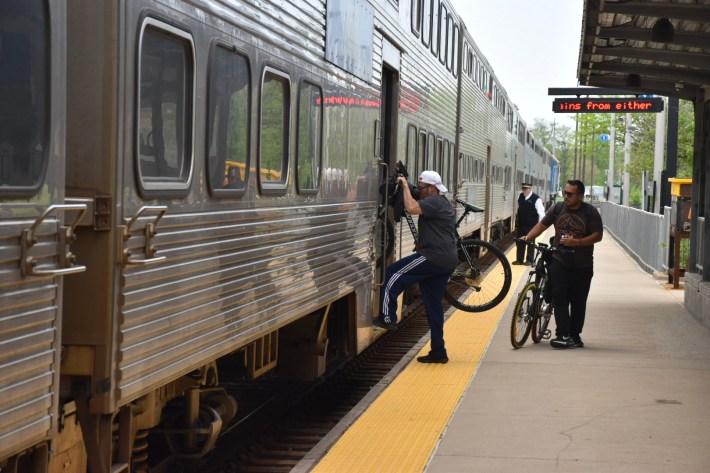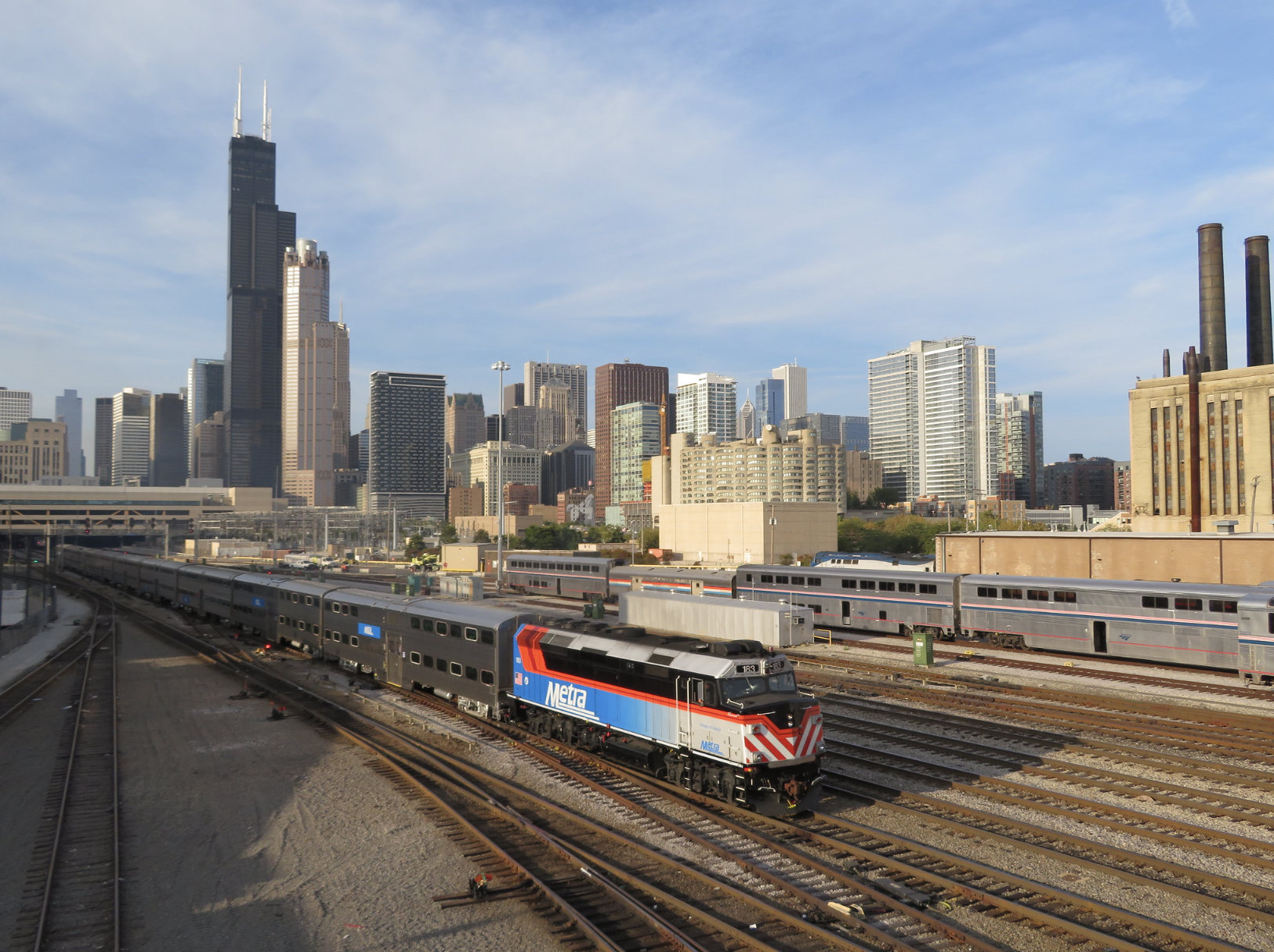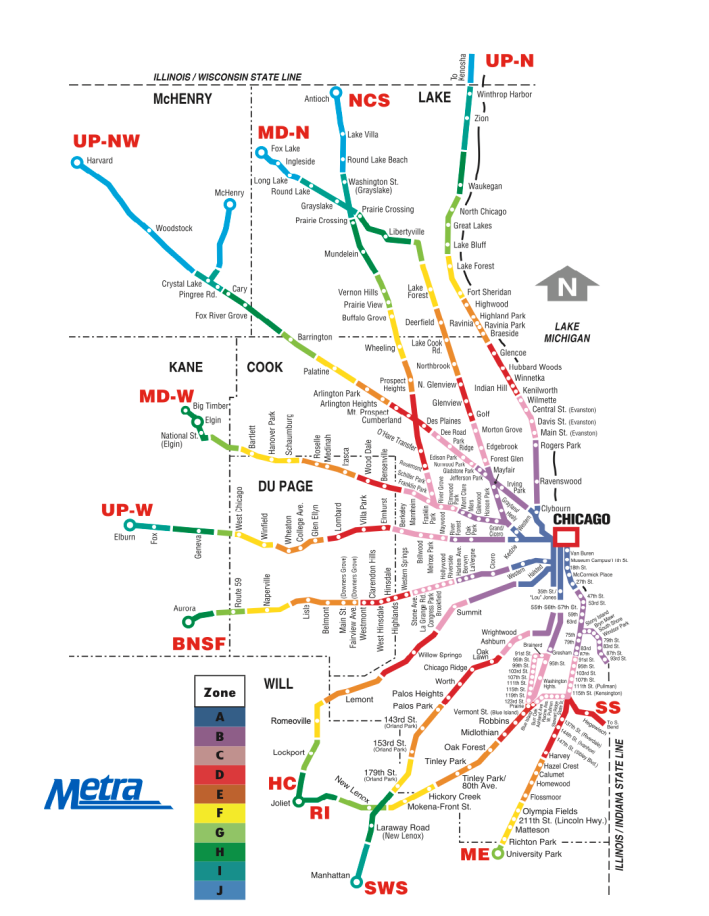When I first looked into using Metra as a transit option, I was overwhelmed by the relatively complex fare structure, in which the price of a trip varies according to which designated zones you're traveling through. I’ve since become familiar with how to determine the fares for Metra trips.
This summer the commuter railroad is making that process very simple for frequent riders by offering a flat-rate "Super Saver" monthly pass that allows for unlimited travel anywhere in the system. The full-fare pass is $100, and discounted passes for eligible seniors, K-12 students, and riders on the Metra Electric and Rock Island lines will be $70. Thanks to the Cook County-sponsored Fair Transit South Cook discounted fare pilot on the Metra Electric District and Rock Island District lines, you can also buy a $70 Super Saver pass good for unlimited rides on those two routes. That's actually cheaper than a $75 CTA monthly pass (which itself was discounted earlier this year from the previous $105 price.)
Passes for July will become available for purchase on June 20. Buying a Super Saver pass will involve the same process as the regular monthly pass via the Ventra app or from ticket agents, only with a different price. Super Saver passes will look the same as the regular monthly pass which displays a zone pair (fare zones where the rider’s trips originate and end), but conductors will know that during the summer all monthly passes will good for unlimited travel across all fare zones. $6 Day Passes (which allow for unlimited travel within one to three fare zones in a single day) and $10 Day Passes (valid for unlimited travel system wide and a single day) will still be available.
Metra CEO Jim Derwinski said in a statement that the Super Saver passes as part of Metra’s strategy to win back riders following the COVID ridership slump. “Metra’s recovery from the pandemic requires that we look at all the options on the table to reinvent our service by listening to Metra riders, creating new schedules, and exploring fare incentives that allow riders to return or try our system at affordable rates.” Derwinski credits strong regional sales taxes, which fund Metra operations, with allowing Metra to be more creative with using its federal COVID relief funds in ways that benefit riders.
Cool now make it so you don’t have to wait two hours for the next train outside of rush hour https://t.co/1Mmnkcm9Rj
— Shana (@shanasolarte) June 1, 2022
Along with cheaper fares and a more user-friendly fare structure, one of the more obvious ways Metra can gain more riders is to run trains more often. Many lines often run only a single train per hour, or even longer headways, which discourages many people most from riding the train instead of driving. The Super Saver Pass pilot is a step in the right direction, but there's still a long way to go before we have truly convenient regional transit service in Chicagoland.
Star:Line Chicago weighs in on the new pass
The Star:Line Chicago Twitter account, run by a suburban transit advocate, weighed in on the Super Saver pass in a thread today. He crunched the numbers and found that the pass will be a money-saver for people doing longer Metra trips over ten times a month . However, folks traveling between downtown Chicago and urban neighborhoods or inner-ring suburbs less that 17 times a month would be better off using $6 Day Passes.
We are technically this/close to a reasonable Regional Monthly ticket: $125 can now get South Cook riders a Metra Monthly + LinkUp (good for all Pace buses and peak CTA).@cta @Metra @RTA_Chicago Close the gaps and make this finally work!
— Star:Line Chicago (@StarLineChicago) June 1, 2022
Star:Line noted that you don't need to own a smart phone and use the Ventra app to purchase a Super Saver pass, which is a good thing from an equity standpoint. However, he added that you still have to have $100 on hand to buy the new pass, which could be a barrier for lower-income riders.
Overall though, he's a fan. "Metra getting more monthly tickets in more riders’ hands is a great pilot program, and should also (further) boost off-peak ridership." He suggested Super Saver could become even better if Metra lowered the price of a pass for unlimited rides within Zones A, B, and C (the city and inner-ring suburbs) to $75, the same price as the CTA monthly pass.
Read the full Star:Line Chicago thread here.
Chicago Advocacy organizations weigh in on the pass
We reached out to the Active Transportation Alliance for their thoughts on Metra's Super Saver pass. "Metra’s new $100 unlimited pass is another step forward in the agency’s push for simpler and more affordable fares," said ATA spokesperson Kyle Whitehead. "Metra’s zone-based pricing is complex and makes it difficult for riders to budget for the cost of fares, especially new riders. All day and all month passes like this one that are simply and fairly priced can help encourage people to ride and ride more often, which is exactly what the Chicago region needs right now."

Audrey Wennink, transportation director for the Metropolitan Planning Council sees the Super Saver Pass as a way to help more people return to in-person work, access summer activities, and save money on gas. Wennink cities Metra's recent decision to temporarily allow bikes on their trains across all lines as a way for people to combine transit trips with biking. (Metra limits the number of bikes allowed and can refuse bikes or e-scooters if space is needed for a passenger with disabilities, or in the event of crowding.) Wennink adds, "If these lower Metra fares are retained longer term beyond the 3-month pilot period, commuter rail will become much more viable for daily commuting for those with lower to moderate-income jobs, increasing access to a wider range of employment options for more people."





